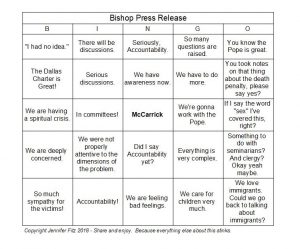A friend wrote in anguish to ask: How do I know what priest I can trust?
It’s a question borne of damning evidence:
- Cardinal McCarrick promoted through the ranks and honored by the nation’s top Catholic universities despite the “open secret” that he was using his power to get away with molesting seminarians.
- The Diocese of Lincoln failing to protect its college students and seminarians from the vocations director who molested them.
- Cardinal O’Malley wisely canceling his appearance in a panel on protecting children and young adults at the World Meeting of Families because the seminarians at Boston’s St. John’s Seminary have spoken up about the sexual harassment they endured.
- The Pennsylvania grand jury’s massive report on the covering up of sexual abuse — even to the point of Cardinal Wuerl approving a monthly allowance from his diocese for a priest removed from ministry because of his sadistic molestation of altar boys — and the report doesn’t even cover the whole state.
It goes on and on. The hushing up of the immorality is rampant and entrenched. It infects not just the United States but clergy at every level, all around the world.
And yet you know in your heart that at least some priests are good. At least some of them are trustworthy. Who are they?
The Stakes are Life and Death
One of the consistent themes in reports of victims — children and adults, men and women, across the nation and over several generations — is the use of god-language to placate the victims. God wants us to do this. Blasphemy in the extreme.
If sexual abuse in general is terribly damaging, it is all the more so when the abuser twists the victim’s relationship with God — cursed if you do, cursed if you don’t.
In a cover-up culture, the victim is abandoned and forsaken. What should be a source of support in a time of suffering is now the death blow. It is no wonder that victims attempt suicide, and that some succeed.
So the question of trust matters. You need to know before pouring your heart out to your priest: Is this guy gonna see I’m vulnerable and take me for an easy mark? Is he going to realize my kids are easy prey because they live in a home where the adults are struggling with some serious issues?
How do I know whom I can trust? is a life or death question.
Less terrifying but still serious: We have learned that many priests who aren’t themselves predators have been complicit in the cover-up culture. Do you want to walk into a counseling session with a guy who is a lifelong practitioner of denial and gaslighting?
When you are already vulnerable, you need to choose your counselors wisely.
We Can’t Live Alone
Trust no one. That’s how it feels right now. That feeling is not misplaced paranoia. That feeling is the result of the fact that all across the United States and around the world our clergy who should have been trustworthy have shown themselves not to be.
But the Trust No One way of life isn’t tenable. Human beings are made for community. We are made to know and be known, to love and be loved. Interdependence isn’t a bug, it’s a feature.
Extending trust to other humans, even in our most vulnerable moments, is necessary for our own good.
But to whom can that trust be given?
Trust is Earned
In a private conversation, a colleague who would know said to me, Bishop X is a good guy. I don’t know Bishop X from a shelter pet. Backwater diocese, doesn’t make the news, Bishop X is just this guy who has worked with my colleague long enough that they’ve gotten to know each other and Bishop X has shown himself to be trustworthy.
I thanked my colleague for saying so, because right now there is nothing Bishop X could say that would prove his innocence.
Right now, our clergy have no credibility — and many lay employees have no credibility either. They cannot speak up in their own defense, because lying and dissimulating are such entrenched habits in the administration of the Catholic Church that you simply don’t know who is telling the truth. We’re living in the world’s largest Agatha Christie novel.
And yet Bishop X has someone vouching for him.
How’d he get so lucky? By his actions.
Trust Isn’t Instant
The trouble with trust is that it takes time to prove. You don’t really know how your priest will handle a difficult situation until he’s given a difficult situation to handle. You have to actually see him admit to mistakes, or hold the painful conversation, or step in and forthrightly bumble his way through complexities that have no one right answer, but can at least be faced bravely and without flinching.
Can you trust your teen to call you if she needs a ride home because her friend started drinking at the party? You’ll never know until the night when she’s stuck out at the party with the drinking friend.
We build a hope of trustworthiness on many small things. Does your priest always prioritize smoothing things over, even if it means tolerating small-scale corruption? Is maintaining a good reputation his most important value? Are complainers dismissed as cranks?
Don’t trust that guy.
As with our children, the way we extend trust to our clergy is by giving them little chances to prove themselves. If you can look back over the years you’ve known your parish priest, or your bishop if you spend that much time with him, and you can see a track record of honesty and integrity — despite whatever his garden-variety flaws might be — there you go.
If you have no such relationship, then start building that relationship. Contact him about a problem — something that isn’t going to devastate you if he fails to address it properly — and see how he handles it. Are his actions consistent with someone who really wants to solve the problem (even if it can’t be solved easily), or does his priority rest with good PR and making sure nothing gets in the way of his personal ambitions?
Watch over time: Does he keep “loyal opposition” involved in parish or diocesan life, or does he sideline anyone who doesn’t shut-up-and-put-up? When a staff member does something wrong (it’s going to happen, to err is human), does he correct the error or does he try to act like his staff are above reproach? Does he himself openly acknowledge his own mistakes, or does he blameshift and gaslight?
It’s a slow process. Trust is proven over time. If your clergy have already shown themselves, over and over again, to be stand-up guys who can be counted on to do the right thing — thank God!
If guarded optimism is the best you can offer right now, then try to find a sane balance between the “guarded” and the “optimism,” neither too fearful nor too over-trusting.
And if you have no evidence of your priest or bishop’s trustworthiness, allow it to be just that: No evidence.
Maybe he’ll prove himself down the road, and that will be good.
Artwork courtesy of Wikimedia, CC 3.0 photo by Fondazione Cariplo














